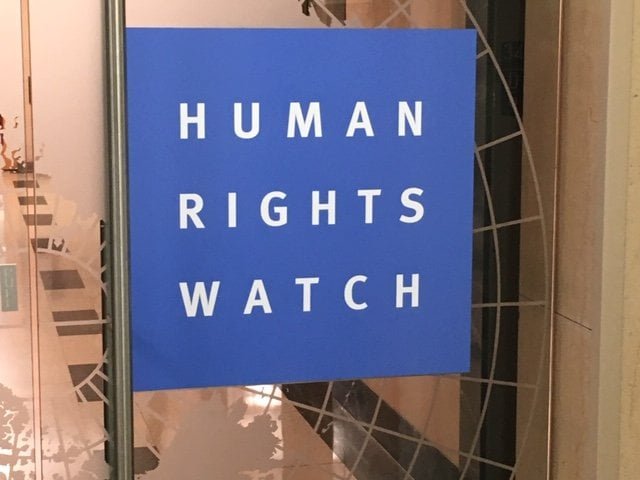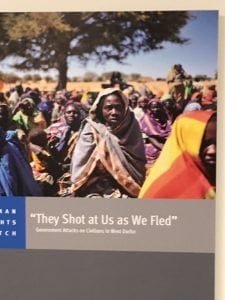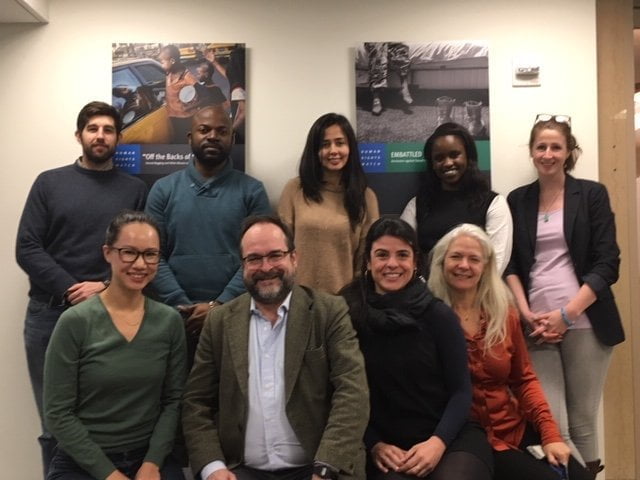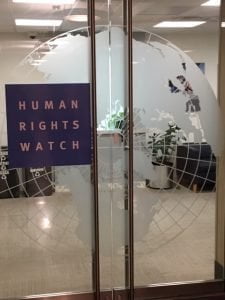Better Than Most is a regular feature of The Business of Giving, examining the best places to work among social good businesses and nonprofit organizations.
Denver: And for this evening’s Better Than Most, we’re going to head on over to the Empire State Building in New York and to the offices of Human Rights Watch. We’ll start the segment with Ken Roth, their Executive Director, and then hear from other members of the Human Rights Watch team.
Ken Roth: My theory has been that the more decisions I have to make, the worst off we are. I want to kick decisions down the hierarchy to the experts. I want the researchers in the field who know their country and know their issue better than anybody else to make as many decisions as possible.

Ivy Shen: We also get 10% contribution back into our retirement funds with a match. Regardless of whether or not we put a cent into it, the organization puts 10% of our salary every year into a retirement plan. Again, I think that’s a benefit that most for-profits don’t even have the opportunity to offer their employees as well. We have fitness reimbursements, we have free flu shots here. And I know these seem really, really simple to talk about but what I think is important is that at a lot of nonprofits, all the money goes towards the mission, and they don’t really think about whether or not it’s important to invest back in the staff. I think one of the good things that Human Rights Watch is able to do is really show that they offer a lot of opportunities for us to receive care and services that really do benefit us as individuals and as employees here, and I hope a lot of other nonprofits are able to really think about the fact that all the money in the world can go towards their program but if they invest a little bit back into the benefits of their employees, it will go a really long way.
Michael Page: Because at the end of the day, we want human rights concerns and our research to resonate with the communities that we’re working with. So I think that’s one thing where really there’s been a sea change from email and the culture of email to moving into these more maybe interactive features that aren’t just internal but are really a part of a collaborative process.
Emina Ćerimović: The dinner was about just us getting together and we would ask each other a question. And one question that went around was “What would you do if money did not matter and if you had an opportunity to do something else than what you are doing now?” When it came to my turn, I said I would be doing what I’m doing now. And why? I’m a researcher and we investigate human rights abuses. I spend a lot of time in the field, and some of the best people that I met in my life are the people that I have interviewed. And it’s something incredible and humbling to the fact that they trust us and that they are willing to share some of the most difficult moments that they have been through, that they’re willing to share the trauma they have been through with us, and that they trust us, and that they trust Human Rights Watch is going to take those stories forward and hopefully have some impact.

Maria Laura Canineu: What is most striking for me coming from Brazil where there is a feeling of distrust between employers and employees, it was always — since my day one — it surprised me the level of transparency and honesty, how people deal with their own problems and how they deal with the managers, and also the high levels of decisions in the organization. That is not common in every single organization. This is something that for me was always very much surprising, welcoming, and admirable.
Benson Weekes: I think people feel engaged like in the case of researchers when they get maybe additional funding or see the victims getting justice for some of the research work that were done. In my opinion, being on the finance side of things, just being able to be able to support researchers and other people within the organization in terms of being able to go out there and getting their job done in itself is very satisfying to me.
Wenzel Michalski: So, life-work balance is floating. We don’t have a nine-to-five job. We can have 24/7 fun with each other. But also it’s respected when you shut down. You say, “Okay, that’s enough. I won’t answer emails at three o’clock in the morning, maybe also won’t answer emails at 11 o’clock in the morning because I have other stuff to do.” It’s a huge tolerance, which is necessary. I think only Human Rights Watch can work like this because the tolerance is there.
Michael Page: And so I think one of the most important thing is how much Human Rights Watch trust. And in particular, the kind of people, at the core of that trust is researchers, and how much researchers are a central part and how much space they have to think strategically about their projects, to think through how they’re doing their documentation. And then to have the kind of trust, let’s call it a collaborative critical process that molto people can feed in. That doesn’t work on strict hierarchy, it works on a level of expertise. And I think that’s part of the culture that I think is one of the most important for producing the work that we do.

Joyce Bukuru: It’s great that I don’t have to go out and look for those people, and they’re sitting right next to me. Even when I am sort of being shy about asking them what they think I should do, they are always asking me like “What do you think you want to do?” and they say, “This is what I think your best skills are.” It’s really great because it’s a really honest assessment of the work that I’m doing. I have a really sort of trusting and a really pleasant relationship with the people that I work with, and I feel really grateful for that because I don’t know that everyone has that, so I just feel really fortunate.
 Wenzel Michalski: I wanted to go into my corner to celebrate but that shows you that it attracts people when you are working for Human Rights Watch. And I have the feeling when I’m in the other office — I’m from the Berlin office — so when I’m in the Paris office, London office, or New York, or Washington, that you come home. It’s your kind of people. I still have to break it to my other family, my wife and my kids, that I have a second family. I don’t know whether they would be very happy with this but maybe they figured it out by now.
Wenzel Michalski: I wanted to go into my corner to celebrate but that shows you that it attracts people when you are working for Human Rights Watch. And I have the feeling when I’m in the other office — I’m from the Berlin office — so when I’m in the Paris office, London office, or New York, or Washington, that you come home. It’s your kind of people. I still have to break it to my other family, my wife and my kids, that I have a second family. I don’t know whether they would be very happy with this but maybe they figured it out by now.
Ivy Shen: I would like to say that you have to come to the crosscutting party every year to really know how our colleagues love to get down and dance. It’s the best part of the year. I think it’s the best part of crosscutting. Here are the people, the lawyers who send back your reports with every single edit under the sun, the head of finance department who questions every receipt you’ve ever submitted; to Ken Roth, who can really just get down and dance. It’s a really great atmosphere. It’s an opportunity for everyone to come together, forget about work and really just enjoy being each other’s company.
Emina Ćerimović: The wow aspect, I think it’s our diversity. We have staff from all over the world. I don’t even know the number of languages we speak. You always have someone you could reach to translate something for you, whether it’s in Greek, Arabic, Russian; you name it, we have those people on the team. And I would say that’s our big wow — how diverse we are.
Kristine Beckerle: One of the things he said at his retirement party was now he’s going to keep working to try and get his many friends who have been imprisoned across the MENA region over the last two years out, and this guy just retired but his focus was how he can help the friends that he has made while working at Human Rights Watch activist across the region get out of jail. And I think the thing for me that’s really inspiring about that is you have someone who’s worked for decades on human rights in the Middle East, and even at his retirement party, the thing he’s thinking about is how he can help his friends, and that’s something to be sought after.
Maria Laura Canineu: People like me that have to go across every single aspect of the organization — research, advocacy, and media — have plenty numbers of people to learn from and to get inspired from. For me, media, for instance, is something that I have never done before. And now I see people in Brazil who I never saw, and they see me and they say, “I saw you somewhere. I know you …. Oh, I saw you in TV. I heard you at the radio.” I have people from all over Brazil that now knows my face but the work that Human Rights Watch does.
Emma Daly: One of the things that happens regularly in New York is Whiskey Wednesday where at 5:30 on a Wednesday afternoon, a bunch of staff get together and drink whiskey together, and people will bring special rice or bourbons or Scotch or Irish whiskey. And quite a lot of the people who do this, when they travel, they’ll actually look for a particular whiskey to bring back for Whiskey Wednesday.

Denver: I want to thank all those who participated in this piece: Emma Daly, Maria Laura Canineu, Benson Weekes, Joyce Bukuru, Wenzel Michalski, Ivy Shen, Michael Page, Emina Ćerimović and Kristine Beckerle. If you want to listen to this again, maybe read the transcript or see pictures of the participants in the HRW offices, they’ll all be there for you at denver-frederick.com and we’ll put up a link to my full interview with Ken Roth, the Executive Director of Human Rights Watch.
The Business of Giving can be heard every Sunday evening between 6:00 p.m. and 7:00 p.m. Eastern on AM 970 The Answer in New York and on iHeartRadio. You can follow us @bizofgive on Twitter, @bizofgive on Instagram and at http://www.facebook.com/BusinessOfGiving

